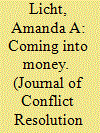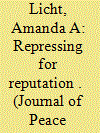|
|
|
Sort Order |
|
|
|
Items / Page
|
|
|
|
|
|
|
| Srl | Item |
| 1 |
ID:
093683


|
|
|
|
|
| Publication |
2010.
|
| Summary/Abstract |
Donors are more likely to send aid to leaders facing elevated risks of losing power, but targets' ability to benefit from this assistance is conditioned by regime type and political processes. The institutionalization of winning coalitions' loyalty across regime type follows opposite patterns, supporting opposite temporal dynamics across regime types. Democratic leaders' coalitions are firmest immediately after taking office, and aid is of most assistance to them at that time. As competition and dissatisfaction grow, aid becomes a political liability. In small winning coalition systems, however, coalitions become more solid over time, facilitating increasing benefits from aid. Without a firm coalition, however, external resources are destabilizing to autocratic leaders. Analysis of 4,692 leader years from 1960 to 2001 using a censored probit model supports these expectations.
|
|
|
|
|
|
|
|
|
|
|
|
|
|
|
|
| 2 |
ID:
184205


|
|
|
|
|
| Summary/Abstract |
The premier data on leader survival focus on the violent, dramatic means by which leaders ‘exit’ office. This information, vital for many research questions, constitutes a valuable public good for the community. Yet, it provides an incomplete picture of the political rise and fall of world leaders. The burgeoning study of leaders using survival analysis requires a fine-grained understanding of not just when, but why and how leaders lose power. We cannot, for example, conclude that a leader’s exit implies a successful application of international pressure if her removal stems from pre-set constitutional laws and the immediate successor has long been considered the heir apparent. The Regular Turnover Details dataset remedies this problem. Two principal variables report information about the manner of each leader’s exit and the relationship between outgoing and incoming leaders, allowing analysts to arbitrate between exits that suggest political failure and those that don’t, identify non-political leaders (such as interim and technocratic executives), and determine whether leaders constitute heirs to power or challengers thereto.
|
|
|
|
|
|
|
|
|
|
|
|
|
|
|
|
| 3 |
ID:
161549


|
|
|
|
|
| Summary/Abstract |
When do leaders use repression? Leadership transitions disrupt the relationship between regime and citizens, introducing uncertainty about whether the state will use force to put down dissent. This shock to the equilibrium level of repression and dissent threatens the survival of new leaders by inviting challenges, incentivizing them to build a deterrent reputation. Investing in repression early allows a rapid re-equilibration, leading to a decrease in the probability of increased repression as a leader gains experience in office. Some leaders, therefore, have a reason to put down dissent early in their tenure to clearly establish a reputation for toughness, one that exists distinct from that of the state or the regime. These dynamics surface only for leaders that break with the prior regime. Those closely linked to the existing order can draw upon an established reputation and need not develop their own. Statistical analyses of changes in repression intensity from 1990 to 2005 reveal strong support for the argument. Breaks with the prior regime produce a short-term increase in repression, but leaders who come to power via such transitions become less likely to change the level of coercion the longer they remain in office. Leaders tied directly to the prior administration exhibit neither tendency.
|
|
|
|
|
|
|
|
|
|
|
|
|
|
|
|
|
|
|
|
|